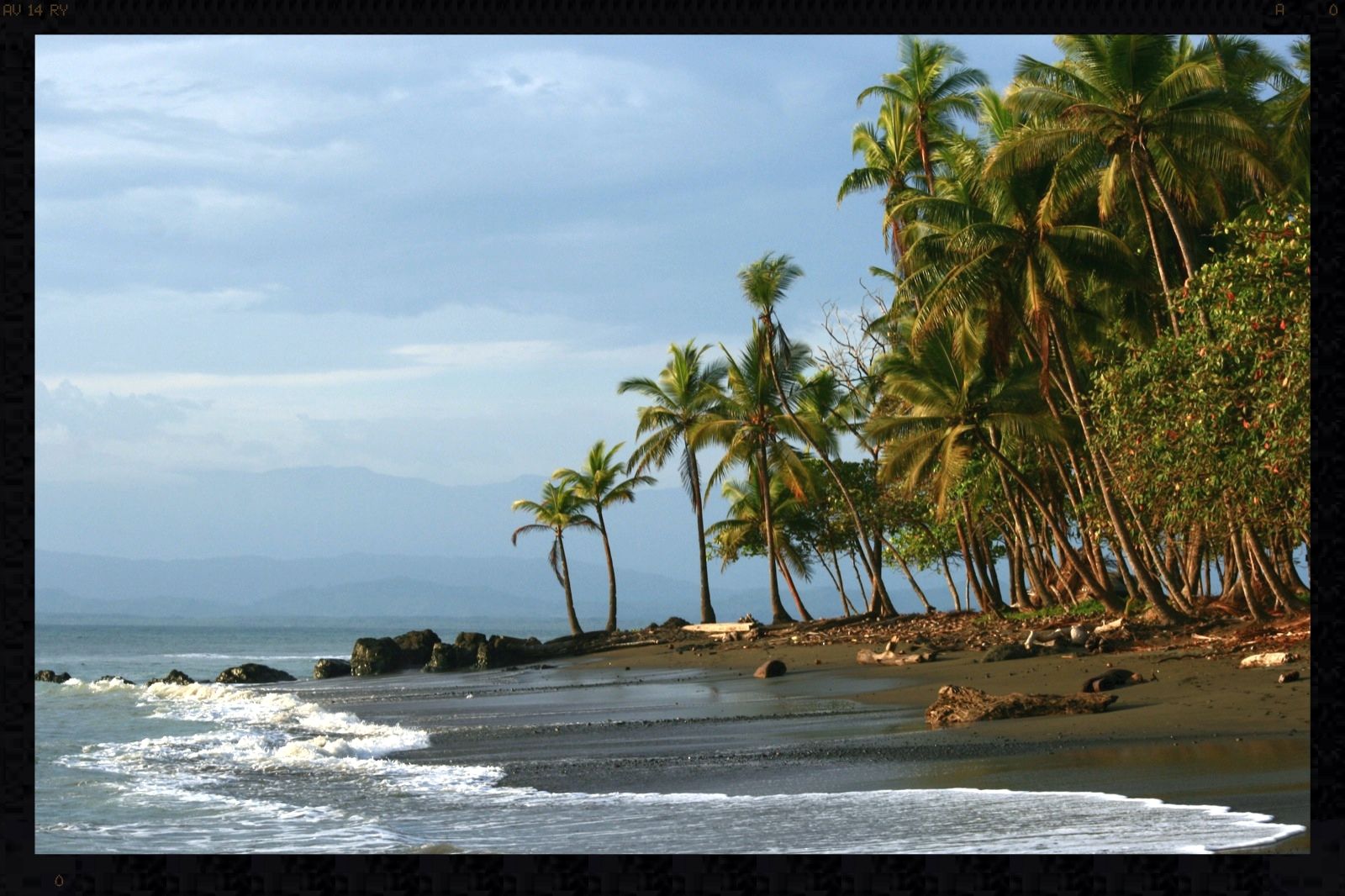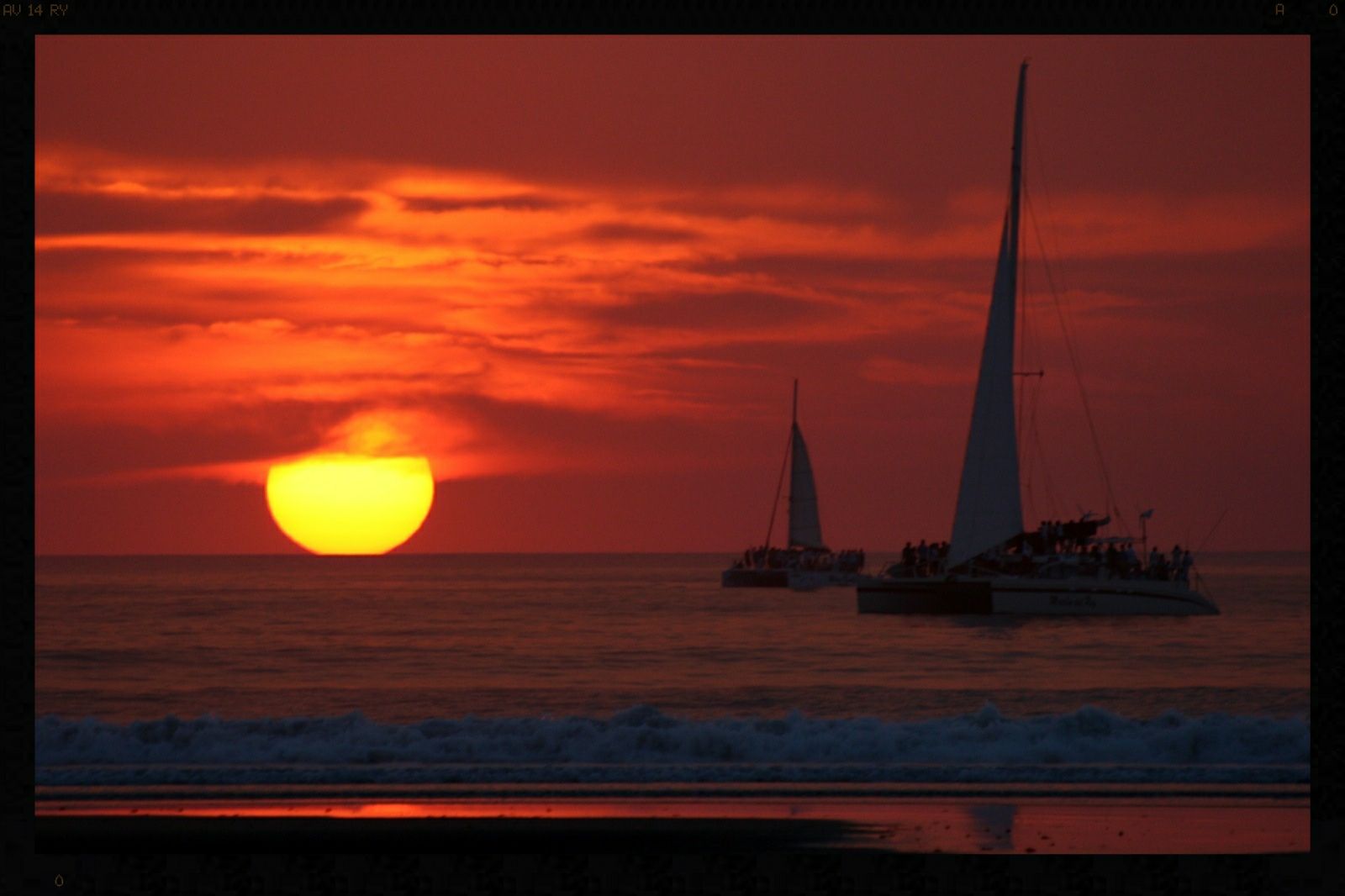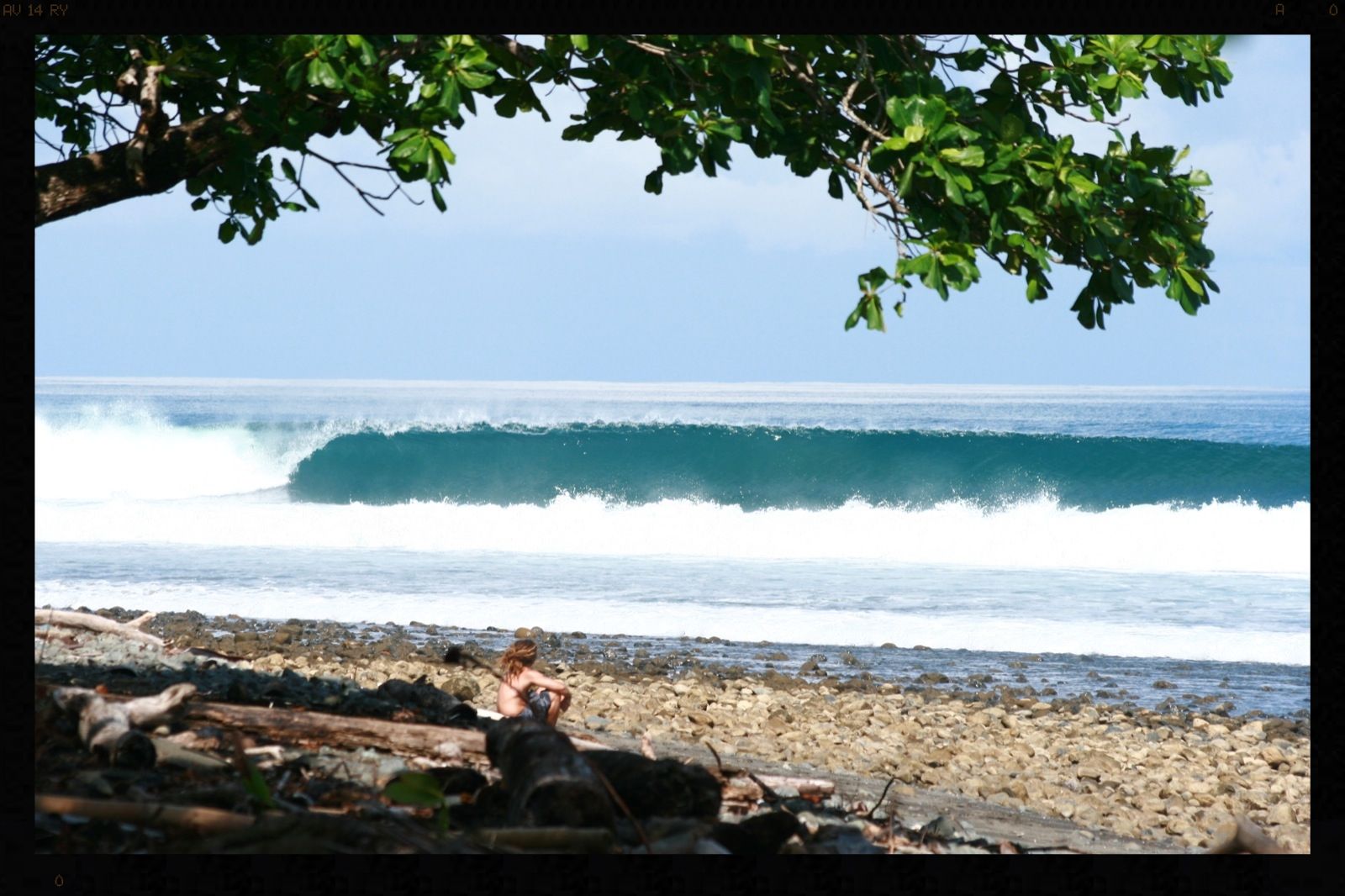Forty years ago, the Kingdom of Pavones was a well-kept secret paradise where only living legends of the surfing subculture were invited to exercise their art under the benevolent eye of Danny "Mack" Fowlie. He created jobs, infrastructure, and helped teach locals construction, heavy machinery operation, and gardening. Fowlie was not short on cash, inherited some money, and made the rest as a real estate speculator and from a leather goods business that supplied high-end department stores. He owned a multimillion dollar farm in Riverside, California, a ranch in Baja, Mexico, and eventually his own private piece of paradise in Pavones.
In the early 60s, Kenny Easton became the first surfing foreigner to find Pavones and its now legendary waves. When Fowlie followed Easton’s secret map and inquired in the Golfito cantinas about the beach property, he quickly bought Rancho Del Mar, his first property for $30,000. From 1974 to 1982, he purchased every beachfront ranch and beach concession from Rio Manzanillo to Punta Banco, giving him over 15 miles of beach-concession land and over 80 percent of Pavones.
Fowlie's kingdom was certainly out of a storybook. The locals got jobs, and he helped teach them construction, heavy machinery operation, and even gardening. But the purchase of the San José mansion of U.S. fugitive Robert Vesco may have been why he came to the attention of U.S. anti-drug agents.
Despite this, Fowlie's dream life in Pavones continued, and his story was documented in "The King of Pavones," a film that contains a lot of Fowlie’s own footage from the time he lived the dream life. Allan Weisbecker's book, "In Search of Captain Zero," is the perfect intro to the story and explains why paradise is a place you visit, not a place you live. Weisbecker sold his home and possessions, loaded his dog and surfboards into his truck, and set off in search of his long-time surfing companion, Patrick, who had vanished into the depths of Central America. At the finale of his critically acclaimed first memoir, he found his paradise at the end of the road, Pavones.
However, living in paradise can be a balancing act of greed and fear. Owning a piece of paradise is a dream for many, but the fear of losing or sharing the slice of heaven can be overwhelming. Weisbecker's follow-up book, "Can't You Get Along," explores the painful editorial process of "In Search of Captain Zero," his fall from grace with the powers that be in Hollywood and the publishing business, and the near loss of his life due to the writing of the book.
In the end, Pavones remains a prized gem for surfers and travelers alike. Fowlie's legacy lives on in the infrastructure he built, and the locals who still benefit from it. The story of the Kingdom of Pavones is a reminder that paradise can be found, but it's up to us to decide whether we want to visit or stay.
The myth of Danny Fowlie started living its own life. Fueled by the books of Allan Weisbecker and films like Chasing the Lotus. However it was best documented in “The King of Pavones”, the film contains a lot of Fowlie’s own footage from the time he lived the dream life.
Allan Weisbecker's book , In search of Captain Zero is the perfect intro to the story. And why paradise is a place you visit, not a place you life. Allan sold his home and his possessions, loaded his dog and surfboards into his truck, and set off in search of his long-time surfing companion, Patrick, who had vanished into the depths of Central America. At the finale of his critically acclaimed first memoir, he found his paradise at the end of the road, Pavones.
Can’t You Get Along follows the previous book with how painful the editorial process of Zero was, and how annoying it was and still is to deal with Hollywood trying to bring these books to screen. The author gets to interact with potential actors playing him: Sean Penn, John Cusack, and Brad Pitt as well as a bucketful of producers, writers, and other people who are supposed to make things happen. It’s exciting, even though Zero, according to Allan, isn’t really a movie, not unless he writes the screenplay to make it into movie-material. It is the story of Weisbecker’s paradise, its underbelly, his fall from grace with the powers that be in Hollywood and the publishing business, plus the near loss of his life due to the writing of the book.


Paradise Found
Back in 1974 Danny Fowlie had it all. Well, almost. Aside from his flotilla of yachts and fishing boats, his private aircraft, boy toys, personal extravagances and priceless artifacts from primitive cultures worldwide, he owned a multimillion dollar farm in Riverside, California, a ranch in Baja, Mexico, plus fugitive financier Robert Vesco’s heavily-fortified compound in San José, Costa Rica. But Danny was poised to possess the one thing he did not have, but wanted most — his own private piece of paradise.
When the first Costa Rican families ventured to the remote, unoccupied area of Pavones in the sixties, the Boruca Indians had already departed the region for the Talamanca Mountains, leaving behind only their gold-strewn graves. Only twenty to thirty Costa Rican families occupied the vast region surrounding Pavones when Fowlie arrived in 1974.
In the early sixties, Kenny Easton, who grew up diving and surfing La Jolla with Fowlie during the dawn of California surfing, became the first surfing foreigner to find Pavones and its now legendary waves.
When Fowlie followed Kenny’s secret map it lived up to Easton’s stories, he immediately inquired in the Golfito cantinas about the beach property, and within a few days, Fowlie had bought Rancho Del Mar, his first property for $30,000.
One by one, the other beach owners approached him to sell pieces of their land. From 1974 to 1982, he purchased every beachfront ranch and beach concession from Rio Manzanillo to Punta Banco. These purchases gave him over fifteen miles of beach-concession land and over eighty percent of Pavones. By the summer of 1974, Dan had moved his family into huts he constructed on the beach and had begun employing almost every local to build essentially every public amenity found in Pavones today.
Pavones was yet to be known as one of Costa Rica’s most prized pointbreak gems. Said to offer up to three minute long leg-burners as the left-hander wraps its way down a series cobblestone beaches.
Fowlie's kingdom was certainly out of a story book. The locals got jobs, and he helped teach them construction, heavy machinery operation and even gardening. Fowlie was not short on cash. Some money was inherited. The rest he made as a real estate speculator and from a leather goods business that supplied high-end department stores. Fowlie, was 41, when he arrived in Pavones, setting up a dream life he didn't need to escape.
But the purchase of the San José mansion of U.S. fugitive Robert Vesco may have been why he came to the attention of U.S. anti-drug agents.
After several years of risky investments and dubious credit dealings, Vesco was alleged guilty of securities fraud. He immediately fled the ensuing U.S. Securities and Exchange Commission investigation by living in a number of Central American and Caribbean countries. Vesco was notorious throughout his life, attempting to buy a Caribbean island from Antigua in order to create an autonomous country and having a national law in Costa Rica made to protect him from extradition. After settling in Cuba during 1982, Vesco was charged with drug smuggling during 1989. Vesco was sentenced to 13 years in jail by Cuba. In November 2007 the New York Times reported that he had died of lung cancer at a hospital in Havana, although it has been suggested that he faked his death.
Clearly not the kind of dream Dan was chasing. Dan kept himself busy with planting 200.000 trees to develop nurseries, teach locals how to farm and develop balsa and cocoa trees. Tom O’Neill (of the O’Neill wetsuits family) helped him plant thousands of palm trees from Rancho Del Mar south to Rio Claro and north to Rio Manzanillo.
Dan cut roads, at first only within his kingdom, but soon bridges spanned the plethora of rivers and streams descending from the inland rainforest; the deep seaside bush was cleared for a private airstrip; schools and churches were built; farms sprang up, overseen by experts in soil and crop management. Fowlie bought and rebuild the Cantina in 1976 which became a gathering place for all the local families.
He hauled in heavy equipment, building materials and generators, along with foodstuffs to sustain his crew of Costa Rican farmers and imported agronomists, veterinarians, oceanographers and engineers, until the farms and fishing boats he envisioned could start producing and make the community he foresaw self-sustaining.
When the surf was flat in Pavones, you’d find him working with the locals on one of their many planting or building projects. When the swell rose, he enjoyed the company of no more than ten surfers in the water, a group composed of his son and son’s friends, of locals they taught how to surf, or of living legends like Buttons, Pat Curren, and Rory Russell, all of whom he knew from his surfing and shaping days in California and Hawaii in the forties and fifties. He also invited early surf cinematographers Spyder Wills and Greg Weaver to document the waves at Pavones between 1976 and 1982. They created hundreds of recordings during their extended visits, some of which footage the surf documentary Chasing the Lotus features and more of which footage featured in "King Of Pavones", a Love Machine Films’ documentary.
Mid 80’s. The Turning Point.
Danny Fowlie becomes a fugitive from United States justice. When he was detained in México in 1985, California investigators found there the evidence, an ounce of marijuana, that eventually resulted in a federal conspiracy trial. Let me repeat, one ounce !
His land holdings began to deteriorate under pressure from people who doubted that he would come back. Dannyland was up for grabs.
In the mid 20th century, Golfito was a major banana growing region (also resulting in it being the major port of southern Costa Rica), but a combination of worker unrest, declining foreign markets, rising export taxes and banana disease led to the closing of the United Fruit Company in 1985. Over the Easter holiday known as Semana Santa, several hundred squatters from Golfito are bused and trucked to Pavones in a large scale, unlawful invasion of the area. The Costa Rican government, fearing political fallout from the left, does nothing. The squatter wars had begun.
The State Department travel advisory urged U.S. citizens to avoid the Pavones area. This kept the surf lineup uncluttered with uncommitted, here-on-a-two-week-surf-vacation lightweights. It only amplified the cult status to die-hard surf travel pioneers.
In 1987, the tides of fortune then turned against Fowlie when he was convicted and incarcerated in Mexico at the request of the US, later extradited to federal prison on Terminal Island, California, in Rancho Del Rio 1990, and then released in 2004.

Free at last. The dream shattered.
After waiting eighteen years to return to Pavones, Fowlie’s dream of living there again was shattered. In June 2005, Costa Rica’s Director General of Immigration exiled Fowlie from Costa Rica for purposes of public safety on the basis of reports that Fowlie’s brief return to Pavones after his release from prison caused public fear and disorder in the region. Fowlie says his trip was peaceful and uneventful. La Nación quoted locals who said they feared him, and the immigration director banned him from the country based on the newspaper article.
The entry prohibition appears to have been overkill because Fowlie notes that he was accompanied by an off-duty Costa Rica police officer, and he was shadowed by two on-duty officers. It is said that the encounters where locals claimed they were threatened were taped and refute the claims.
The Legal Battle for Paradise
The land manipulations have frequently broken into the news with a fatal shooting in 1997 and the 2011 arson fire of the legendary Bar and Restaurant La Esquina del Mar that Fowlie built. Fowlie appears to have purchased legally all the concessions that he holds and also has been paying the municipal taxes. Still his efforts to reclaim any land he says he holds will be a big payday for scores of lawyers. Hundreds of expats and Costa Ricans face similar ownership threats.
Mid 2015. The Tico Times published “Pavones: Small Costa Rica surfing town faces big growing pains” . Karl Kahler wrote an unbiased report about the Pavones Point project that most people seem to think is a terrible idea. Two buildings are currently under construction, with the first models scheduled to be completed by Mid 2016. Each building will contain four two- or three-bedroom condominiums, with prices starting at $475,000. Eventually, plans call for 15 buildings, or 60 units.
Virtually all the expats here are against it, and many of the Ticos too, but some of the locals are 100 percent for it, welcoming the jobs it will bring, hoping it will help to get the roads paved, to improve the water supply. But does a development like this misses the point ? Pavones is a small community. People like to come there for that reason.
Paradise saved
12 years ago a multinational company received approval to install the world’s first yellowfin tuna farm near the mouth of the Golfo Dulce. The tuna farm as planned would pollute the area, endanger sea turtles, affect the existing fish population, and threaten the world-class wave. A lawsuit was filed just in time, and the project was successfully stalled. Thus began an unlikely alliance of local surfers, fishermen, and global environmental groups to save a wave and one of the most biodiverse places on the planet. Additionally, José Ureña, president of the Costa Rican surf federation, has officially nominated Pavones as the country’s World Surfing Reserves candidate wave.
In The Battle for Paradise, Jeremy Evans travels to Pavones to uncover the story of how the locals stood up to a multinational company and how Danny became once again, a hero, saving paradise. Dan Fowlie’s and Parque Pavones’s financial support to the legal battle against the tuna-farming project helped stop the project—thereby saving Golfo Dulce, one of the most diverse biospheres in the world, from an environmental disaster.
Fowlie united the region in economic, environmental, and social prosperity for over a decade. Parque Pavones clearly wants to build upon that community’s decade of accomplishment. In Fowlie’s absence, the past’s united effort to develop Pavones in a manner prosperous to the whole community and environment has dissipated. Collaboration between Parque Pavones and Daniel Fowlie has the ambition to provide immediate support and long-term advantages to the Pavones region. The clear vision of the king continues. The rest is history.
